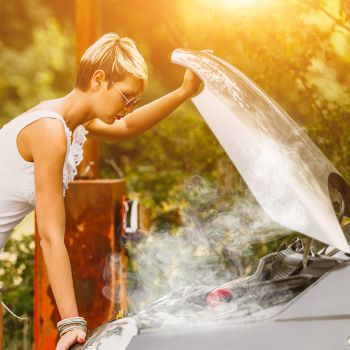 While driving, steam may suddenly start pouring out from underneath the hood of your car. An overheated vehicle engine can happen to anyone, anywhere. Learn why this occurs, the affect it can have on your engine and how to respond.
While driving, steam may suddenly start pouring out from underneath the hood of your car. An overheated vehicle engine can happen to anyone, anywhere. Learn why this occurs, the affect it can have on your engine and how to respond.
Signs of an Overheated Engine
While overheating is more likely to occur in the summer, signs indicating this issue include:
- A warning light comes on your dashboard, usually red or yellow to indicate seriousness
- Vapor emerges from your vehicle, usually originating from the cooling system
- The engine temperature gauge on the dashboard reads “H” or reaches the red zone
- You notice a strange smell coming from the engine area
Why Does the Engine Overheat?
Engine overheating may be related to several key concerns with the vehicle:
- Low Coolant: Added to cars to prevent the engine from overheating, coolant circulates through the engine. After traveling through the radiator, it goes through the engine to transfer heat away and out into the air, where it leaves through the exchanger. Low coolant may be due to lack of maintenance, a leak or clogged hose blocking flow. A pool of coolant underneath your vehicle can indicate a leak, as can rapid use of the fluid.
- Cooling System Issues: In addition to coolant, other aspects of your cooling system can malfunction, including the radiator fan, gaskets, hoses and water pump. This impacts how efficiently the engine stays cool and could be the result of a leaky or loose radiator cap.
- Oil Issues: Regular oil changes keep your engine lubricated. Along with coolant, oil helps decrease the amount of heat trapped inside the engine. Older oil that’s thin or picks up debris no longer provides effective lubrication, nor does it help dissipate heat.
- Malfunctioning Thermostat: The thermostat can provide an incorrect reading that the temperature is normal, when in fact it’s too hot. This prevents the coolant from being released and effectively circulating through the engine to manage heat buildup.
What To Do When Your Engine Overheats
Once you see steam coming out from under the hood while driving, you’re advised to:
- Pull off the road to a safe area
- Turn off the air conditioning and roll down the windows
- Wait to open the hood to avoid being splashed and burned with hot coolant
- Turn the heater and fan on all the way to prevent placing additional stress on the engine and help stabilize its temperature
Call for roadside assistance, as driving too far with an overheated engine can result in engine failure.
What Can Happen to the Engine?
If your car engine routinely overheats, the following might occur:
- Failed Head Gasket: The gasket creates a seal between the engine block and cylinder head, helping all fluids flow to their respective areas. Excessive heat can warp the engine’s aluminum, eventually resulting in cracks and causing the cylinder head to separate from the engine block. This occurrence causes the engine to go through fluids at a faster pace.
- Damaged Engine Block: The engine block may also experience a degree of warping and eventually crack. This can impact its performance and result in damage, requiring a new engine.
- Warped Cylinders: The heat generated from the engine has potential to melt and warp the cylinders and pistons powering the combustion process. This distorts their shape, allows engine oil to enter the combustion chamber and causes friction, resulting in additional wear and a knocking sound that can signal your engine is about to fail.
Did your engine recently overheat? Schedule an appointment with DaSilva’s Auto Body to have the issue diagnosed and repairs or engine replacement recommended. To learn more, contact our Naugatuck shop today.




